Empower your R&D teams to build better products
From product strategy to launch, manage it all with one agile platform.
What would you like to manage?
Roadmap planning
Feature backlog
Sprint management
Retrospective
Bug tracking
Project
management
Release plan
✦ No credit card needed ✦ Start your free trial ✦

All the features every product team needs
From sprint planning, daily standups, to retro and sprint review, manage the lifecycle of your sprints directly in monday Dev
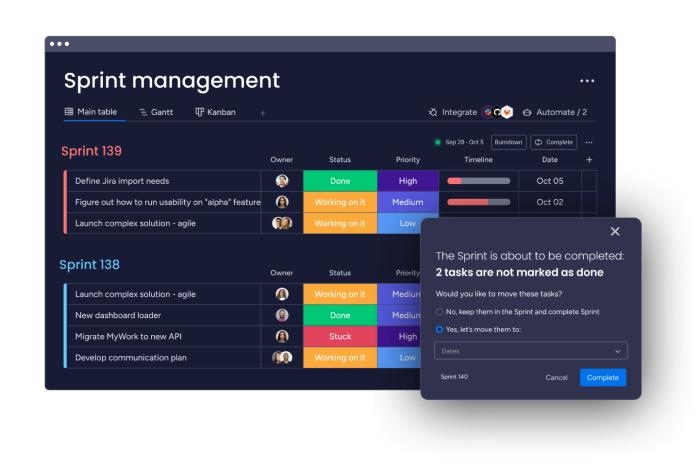
Easily detect any potential problems or bottlenecks through tracking your sprint progress by comparing the actual remaining effort with the ideal progress
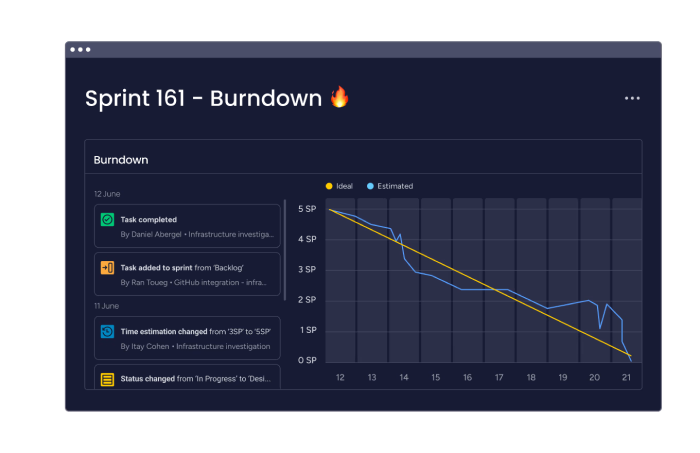
Streamline updates directly from your Git repository to update the status within monday and track progress directly through your Git dashboard.
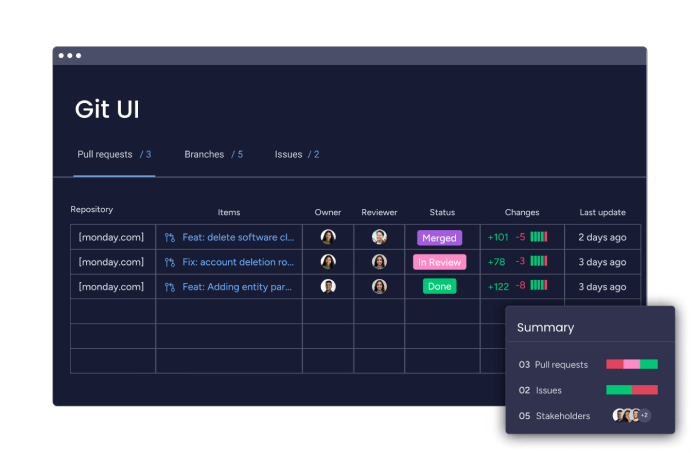
This workspace allows your team to collaborate on documentation, work on projects, and save time by leveraging their collective knowledge right from within monday

Choose from predefined recipes or easily build an automation to
fit your needs in just a few clicks
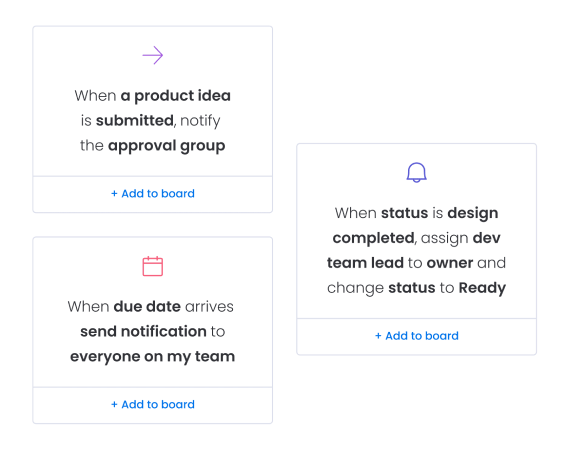
Accelerate the journey from conceptualization to launch
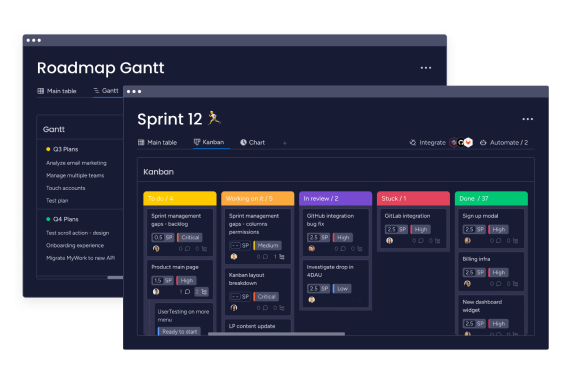
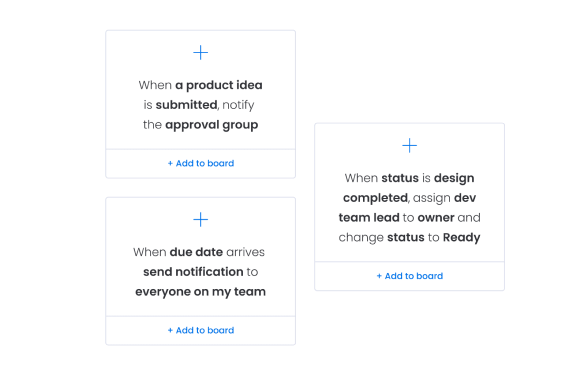
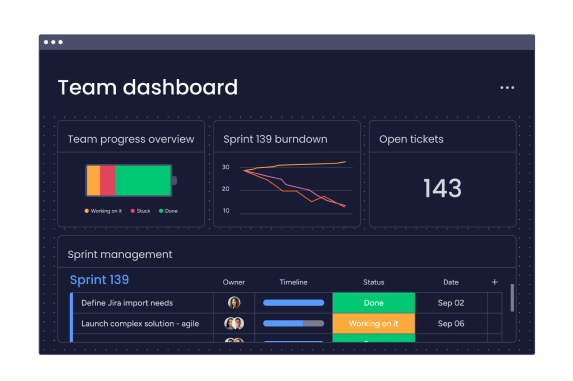
Ready to experience true product development?
Try monday dev, risk-free and explore all the features and benefits of your next product management solution.
Unlock the power of monday dev
Get exactly what you need out of your work software with 200+ integrations and apps built specifically for monday.com
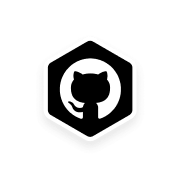
GitHub integration
Easily connect your repositories and pull requests.
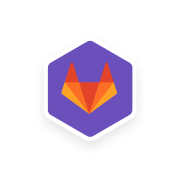
GitLab integration
Connect your GitLab issues with monday.com items easily.
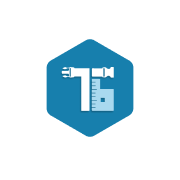
CarbonToolbelt
Connect more processes with extended automation capabilities.
Need some help building out or scaling monday dev?
CarbonWeb offers full service packages to help launch, onboard and tailor monday dev to help drive your dev team’s objectives forward.
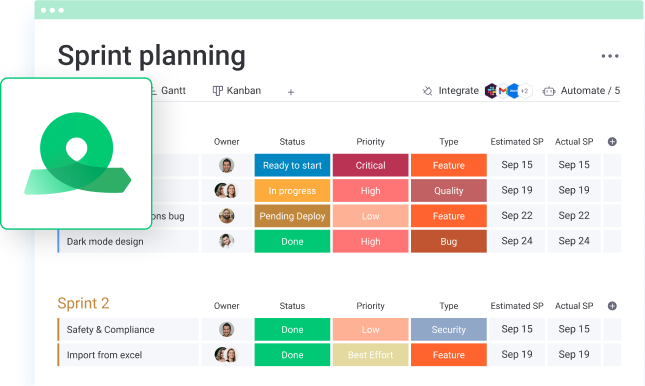
Frequently asked questions
- Sprint Management: Plan, track, and manage sprints with customizable boards, ensuring efficient sprint execution and progress tracking. Backlog Management: Organize and prioritize tasks, user stories, and epics in a centralized backlog, facilitating clear visibility and strategic planning.
- Collaboration Tools: Enhance team communication with integrated chat, comments, and @mentions, fostering real-time collaboration and feedback.
- Automations: Automate repetitive tasks and workflows to save time and reduce human error, such as setting due dates, assigning tasks, and updating statuses.
- Integrations: Seamlessly integrate with popular development tools like GitHub, GitLab, Jira, Slack, and others to create a unified workflow environment.
- Dashboards and Reporting: Gain insights into project performance with customizable dashboards and reports, tracking key metrics and milestones.
- Version Control: Track code changes, manage versions, and collaborate on code with built-in version control integrations.
- DevOps Tools: Manage continuous integration and continuous deployment (CI/CD) pipelines, monitor infrastructure, and ensure smooth operations with DevOps functionalities.
Sprint management involves planning, executing, and reviewing short, time-boxed periods known as sprints within Agile project management. It focuses on delivering a specific set of features or functionalities within a sprint, typically lasting 1-4 weeks. The goal is to ensure continuous progress and iterative improvement in product development.
An epic is a large body of work that can be broken down into smaller tasks or stories within Agile project management. Epics help in organizing work around broader business goals and often span multiple sprints. They provide a high-level overview of what needs to be accomplished and are eventually decomposed into smaller, actionable items.
The Agile methodology is a flexible and iterative approach to project management and software development. It emphasizes collaboration, customer feedback, and small, rapid releases. Agile breaks projects into small, manageable units of work called iterations or sprints, which typically last 1-4 weeks. The methodology encourages continuous improvement, adaptation to changing requirements, and delivering functional software incrementally. Agile promotes cross-functional teams, frequent communication, and active involvement of stakeholders throughout the development process. Popular frameworks under the Agile umbrella include Scrum, Kanban, and Lean.
Scrum is an Agile framework for managing and completing complex projects. It involves roles like Scrum Master, Product Owner, and Development Team, and ceremonies such as Sprint Planning, Daily Standups, Sprint Reviews, and Retrospectives. Scrum emphasizes iterative progress, collaboration, and flexibility in adapting to changing requirements.
The Waterfall methodology is a linear and sequential approach to project management. It involves distinct phases: requirements, design, implementation, testing, deployment, and maintenance. Each phase must be completed before moving to the next, making it suitable for projects with well-defined requirements and low expected changes.
The Hybrid methodology combines elements of both Agile and Waterfall approaches to leverage the strengths of each. It allows for flexible, iterative progress (as in Agile) within a structured framework (as in Waterfall). This approach is useful for projects that require a balance of predictability and adaptability, accommodating both rigorous planning and iterative development.
An Agile workflow is a streamlined process used to manage and execute projects within the Agile methodology framework. It involves a series of stages that emphasize continuous delivery, iterative progress, and collaboration. Here are the typical stages of an Agile workflow:
- Backlog Creation: All tasks, features, and requirements are collected and prioritized in a backlog.
- Sprint Planning: The team selects a subset of backlog items to work on in the upcoming sprint, defining goals and tasks.
- Development: The team works on the selected tasks, focusing on small, incremental progress. This stage includes designing, coding, and testing.
- Daily Standups: Short, daily meetings where team members discuss progress, challenges, and plans for the day.
- Review: At the end of the sprint, the team reviews the completed work with stakeholders, gathering feedback and demonstrating new features.
- Retrospective: The team reflects on the sprint, discussing what went well, what could be improved, and implementing changes for future sprints.
- Release: Completed features are integrated, tested, and released to users, ensuring continuous delivery of functional software.
This iterative process repeats, allowing teams to adapt to changes quickly, incorporate feedback, and deliver high-quality products efficiently.
What is a Scrum Master?
A Scrum Master is a key role within the Scrum framework, responsible for ensuring the Scrum team adheres to Scrum principles and practices. The Scrum Master acts as a facilitator, coach, and servant leader, helping the team to achieve its goals efficiently. Here are the primary responsibilities of a Scrum Master:
- Facilitating Scrum Events: The Scrum Master organizes and facilitates key Scrum ceremonies, including Sprint Planning, Daily Standups (Daily Scrum), Sprint Reviews, and Sprint Retrospectives.
- Removing Impediments: The Scrum Master identifies and removes obstacles that may hinder the team’s progress, enabling the team to focus on delivering value.
- Coaching the Team: The Scrum Master educates and guides the team on Scrum practices and principles, helping team members understand their roles and responsibilities within the framework.
- Promoting Continuous Improvement: The Scrum Master encourages a culture of continuous improvement by facilitating retrospectives and helping the team to implement actionable improvements.
- Protecting the Team: The Scrum Master shields the team from external disruptions and distractions, ensuring a conducive work environment for productive sprints.
- Collaboration and Communication: The Scrum Master fosters open communication and collaboration among team members, stakeholders, and the Product Owner to ensure alignment and transparency.
- Supporting the Product Owner: The Scrum Master assists the Product Owner in managing the product backlog, ensuring that it is well-organized and prioritized according to the team’s capacity and project goals.
The Scrum Master plays a crucial role in enabling the Scrum team to deliver high-quality products efficiently while fostering a positive and collaborative team environment.
Need monday.com help?
Products, pricing, integrations, board building, and more. CarbonWeb is your dedicated partner to help you make the most of monday.com.
-
Products
- App Network
- Apps
- Suites
- Recommended Apps
-
Services
- Workflow Automation
- Carbon Creative
- Demo
-
Company
- About Us
- Partners
- Careers
- monday.com
-
Resources
- Digital Directive
- Support
- Blog
- Contact Us
- 4420 Sherwin Rd #3, Willoughby, OH 44094
- (216) 666 2522